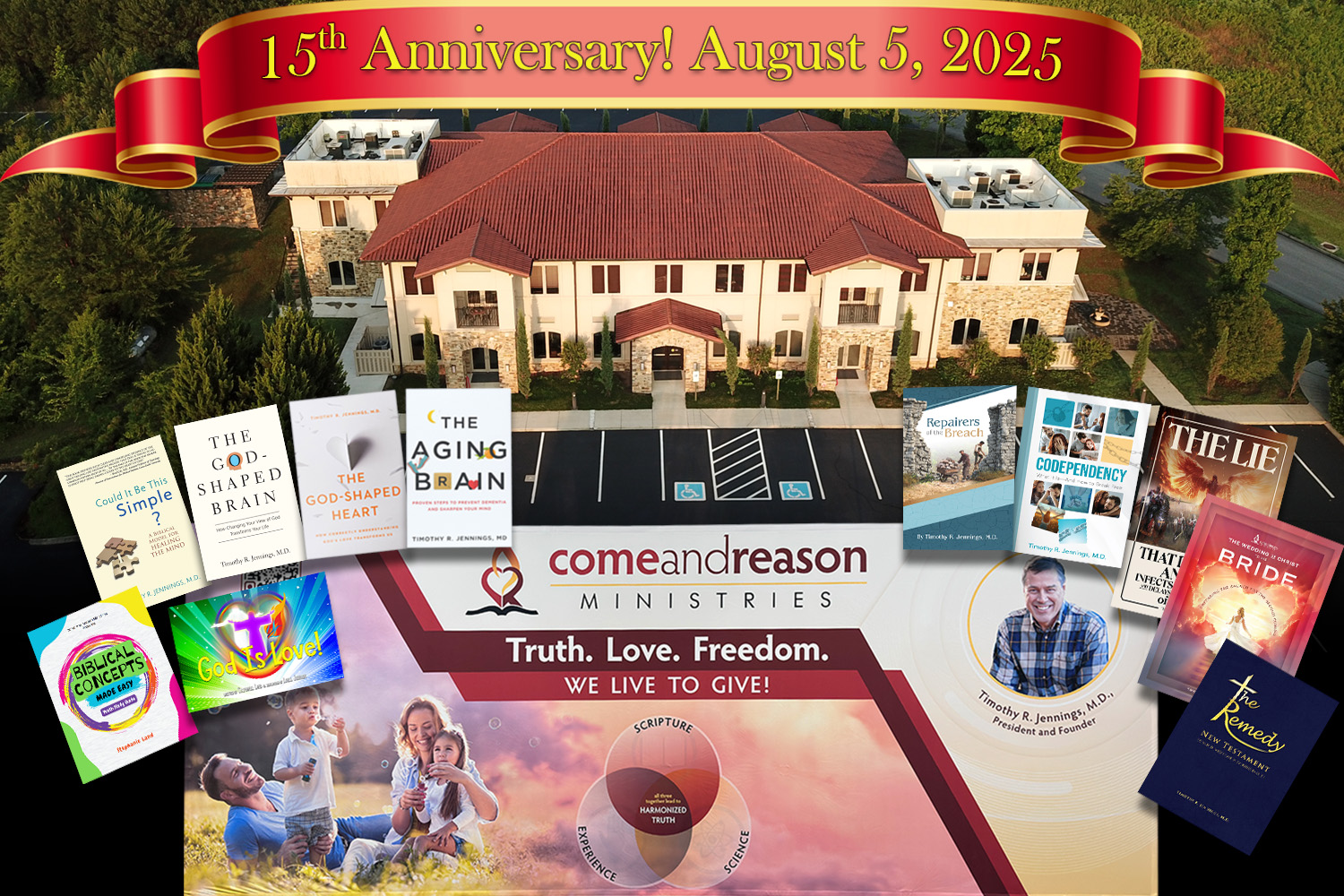Your thoughts on how to Biblically approach addiction would be helpful to me. I heard a definition of addiction that included the idea that addiction is believing that there is life outside of Jesus Christ. With this definition any area of life could easily be classified as addiction.
Thank you and God bless, B
The definition I like for addiction is: The compulsive engagement in behaviors that bring short term reward but long term destruction. All addictions meet this definition.
Regarding Biblical approach to addiction the twelve steps programs, while presented generically as not to offend non-Christians, are designed upon the steps of Christian conversion and spiritual maturation. Below are the twelve steps of Alcoholics Anonymous. Under each step I have listed some Bible references:
- We admitted we were powerless over alcohol—that our lives had become unmanageable.
- “On hearing this, Jesus said to them, “It is not the healthy who need a doctor, but the sick. I have not come to call the righteous, but sinners.” Mark 2:17.
Step one we must admit our inability to heal ourselves and our need of a Savior.
- Came to believe that a Power greater than ourselves could restore us to sanity.
- “For God so loved the world that he gave his one and only Son, that whoever believes in him shall not perish but have eternal life. For God did not send his Son into the world to condemn the world, but to save the world through him.” John 3:16,17
- “But I, when I am lifted up from the earth, will draw all men to myself.” John 12:32
Step two we must know the truth about God – that He is in the saving business and not the condemning business and He has the ability to heal us.
- Made a decision to turn our will and our lives over to the care of God as we understood Him.
- “Come to me, all you who are weary and burdened, and I will give you rest. Take my yoke upon you and learn from me, for I am gentle and humble in heart, and you will find rest for your souls. For my yoke is easy and my burden is light.” Matthew 11:28-30
- “Here I am! I stand at the door and knock. If anyone hears my voice and opens the door, I will come in and eat with him, and he with me.” Rev 3:20
Step three we must choose to open our hearts to Him and let His power transform and heal us from within.
- Made a searching and fearless moral inventory of ourselves.
- “Search me, O God, and know my heart; test me and know my anxious thoughts. See if there is any offensive way in me, and lead me in the way everlasting.” Psalms 139:23,24
Step four we must stop running from the truth about ourselves and our misdeeds. It is only as we are truthful that we can experience healing (John 8:32).
- Admitted to God, to ourselves, and to another human being the exact nature of our wrongs.
- “When anyone is guilty in any of these ways, he must confess in what way he has sinned.” Leviticus 5:5
- “Bear with each other and forgive whatever grievances you may have against one another. Forgive as the Lord forgave you.” Colossians 3:13
- “Brothers, if someone is caught in a sin, you who are spiritual should restore him gently. But watch yourself, or you also may be tempted. Carry each other’s burdens, and in this way you will fulfill the law of Christ.” Galatians 6:1,2
Step five is grace in relationship. As we confess our wickedness and experience love and acceptance from God and humans our shame is replaced with love and empowers us to move forward in healing. (John 8:1-11).
- Were entirely ready to have God remove all these defects of character.
- “I will cleanse them from all the sin they have committed against me and will forgive all their sins of rebellion against me.” Jeremiah 33:8
- “I will sprinkle clean water on you, and you will be clean; I will cleanse you from all your impurities and from all your idols. I will give you a new heart and put a new spirit in you; I will remove from you your heart of stone and give you a heart of flesh. And I will put my Spirit in you and move you to follow my decrees and be careful to keep my laws.” Ezekiel 36:25-27
- “This is the covenant I will make with the house of Israel after that time, declares the Lord. I will put my laws in their minds and write them on their hearts. I will be their God, and they will be my people.” Hebrews 8:10
Step six is heart honesty. God cannot remove from us what we persistently hold on to. If we really want freedom we must honestly let go of our addiction.
- Humbly asked Him to remove our shortcomings.
- “Wash away all my iniquity and cleanse me from my sin.” Psalms 51:2
- “Create in me a pure heart, O God, and renew a steadfast spirit within me.” Psalms 51:10
Step seven is the daily acknowledgement that we are powerless to change our own characters or natures and daily reaching out to God for His transforming presence.
- Made a list of all persons we had harmed, and became willing to make amends to them all.
- Made direct amends to such people wherever possible, except when to do so would injure them or others.
- “Therefore, if you are offering your gift at the altar and there remember that your brother has something against you, leave your gift there in front of the altar. First go and be reconciled to your brother; then come and offer your gift.” Matthew5:23,24
Step eight and nine are applying new methods, principles and motives to the life. The process of thinking about the welfare and health of others rather than self. In doing so we move forward in God’s healing and deliverance.
- Continued to take personal inventory and when we were wrong promptly admitted it.
- “Therefore confess your sins to each other and pray for each other so that you may be healed. The prayer of a righteous man is powerful and effective.” James 5:16
Step ten prevents new mistakes from taking root and becoming habits.
- Sought through prayer and meditation to improve our conscious contact with God as we understood Him, praying only for knowledge of His Will for us and the power to carry that out.
- “Therefore put on the full armor of God, so that when the day of evil comes, you may be able to stand your ground, and after you have done everything, to stand. Stand firm then, with the belt of truth buckled around your waist, with the breastplate of righteousness in place, and with your feet fitted with the readiness that comes from the gospel of peace. In addition to all this, take up the shield of faith, with which you can extinguish all the flaming arrows of the evil one. Take the helmet of salvation and the sword of the Spirit, which is the word of God. And pray in the Spirit on all occasions with all kinds of prayers and requests. With this in mind, be alert and always keep on praying for all the saints.” Ephesians 6:13-18
Step eleven is growing in our relationship with God, exercising new healthy brain circuits resulting in actually rewiring of our brains over time.
- Having had a spiritual awakening as the result of these steps, we tried to carry this message to alcoholics, and to practice these principles in all our affairs.
- “Peace be with you! As the Father has sent me, I am sending you.” John 20:21
Step twelve is allowing God’s love to flow through you to others and the more we give the more we receive.
One aspect that I have come to recognize as important in recovery from addictions, which is not specifically addressed in the twelve steps, is the importance of “bringing every thought into captivity to Jesus Christ” 2Corinthians 10:5. Science has revealed that even though we may avoid unhealthy behaviors (taking a substance, gambling, shopping) if we engage in the behavior in our imagination the same neural circuits fire as when the actual behavior is carried out. This means that if we long for the addiction in our mind, if we imagine the good old days, if we wish we could engage our addiction, but don’t because we know it will harm or kill us, then our brains do not rewire and our characters do not change. Such persons never experience genuine freedom from their addiction. However, when we not only change our behavior, but our thinking as well, over time our brains actually rewire and what we once found pleasurable will, in time, become repulsive. This is the freedom that unity with Christ brings!









 using your credit or debit card (no PayPal account needed, unless you want to set up a monthly, recurring payment).
using your credit or debit card (no PayPal account needed, unless you want to set up a monthly, recurring payment). instead?
instead?